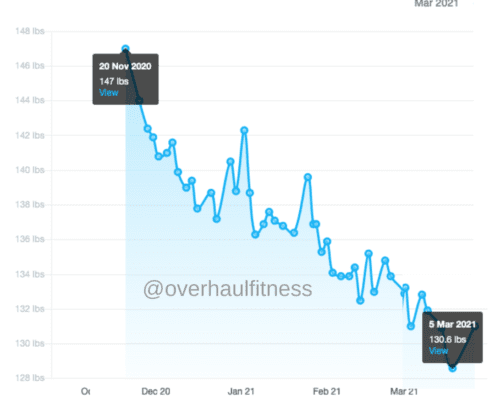7 Things You Should Be Doing For Fat Loss Or Building Muscle
Aug 15, 2021 by Michael Fouts
Read time: 13 minutes
At the time of writing this, OverHaul will be celebrating it’s 7th year of Business. That’s pretty cool, and I have many great clients to thank for this milestone.
This also means that I’ve been doing Personal Training for 7 years, since I made the bold decision to start my own company instead of working for someone else when I started Personal Training.
I thought it would be fitting to share 7 things I’ve learned over the years that might be helpful for others, in particular those looking to lose fat or build muscle – two of the main things I help clients do.
1. Have the Proper Caloric Intake For Your Goal
This is by far the most important thing to get right, in my opinion. Calories are the gas pedal for your results. You can’t build muscle and strength effectively in a caloric deficit, similarly you can’t lose weight in a caloric surplus.
If you’re looking to build muscle, look to shoot slightly above your maintenance intake (250-500+ calories per day); if you’re a beginner you should be looking for 1-1.5% weight increase per month, and 0.5-1.0% and up to 0.5% for intermediate and advanced, respectively.
If you’re looking to lose fat, incorporate a moderate daily caloric deficit to help you achieve 0.5-1.5% weight loss per week; this is usually 500-750 calorie reduction per day from your diet and 3-4 workouts/exercise per week.
2. Don’t Associate Aggressive Weight Loss as Good
As mentioned above, 0.5-1.5% weight loss per week should be your goal. If you lose more, you run the risk of losing muscle in the process; less muscle = less ideal physique. If you want a nice physique at the end of your weight loss journey, make sure you keep this goal in mind.
Losing Weight Can Make You Look Better In Clothes…
Lifting Weights Can Make You Look Really Good Naked
*Keep in mind you can have some larger day-to-day swings due to fluid shifts, but think 0.5-1.5% permanent weight changes – read this on why you should weigh yourself 2-3x per week.
3. For Weight Loss: You Probably Need More Calories, and/or Diet Breaks
Many make the mistake of starting, and continuing with, too aggressive of a caloric deficit. That or they diet for too long without having regular diet breaks. Regular diet breaks are where you strategically increase calories to where you don’t lose weight, or gain, that week (maintenance). Eg. Fat Loss week = 1500 calories per day, Maintenance week = 2000 calories per day.
Why you shouldn’t go too aggressive with your caloric deficit:
- This limits the amount of muscle you might be able to build in a caloric deficit (think muscle growth = better physique, not “bulky” muscle).
Too long without a diet break:
- Going too low, especially for too long, can cause your body to slow it’s metabolism and make it harder for you to lose weight (harder to create a caloric deficit). I won’t get into this too much, read this for more information, but essentially as a conservation method for energy (your body sees an energy deficit as a threat to your survival) your body will start reducing it’s need for energy – through various ways. This is usually seen in those that have been chronically dieting for a while. This doesn’t completely blunt your ability to lose weight, but it does make it harder
- There are no set time interval suggestions of when you should be doing a diet break, or how long. But as a rule of thumb I recommend the following: every 3-4 weeks take at least a 1 week break (bringing calories up to your maintenance).
*One important thing to note: Diet breaks are more important if you’re tracking your calories closely, like 4-5+ days without letting loose on the weekends. If you’re “kind of” tracking your calories, like eating more or less what you want on the weekends, then you probably don’t need to take diet breaks.
Going too low and dieting too long can:
- Plummet your natural levels of testosterone, which otherwise promotes fat metabolism (loss) and muscle synthesis (we want this).
- Make It can be incredibly hard to adhere to, and can promote binge eating events that either lessen your weekly caloric deficit or bring you out of a deficit altogether.
4. You Need To Prioritize Recovery More: Sleep, Stress Management
Recovery is an often overlooked variable in people’s quest for weight loss, or building muscle. The two main sources of recovery that I get clients to focus on is good quality sleep and stress management.
For weight loss sleep is one of the most important things to focus since it has an such a large effect on your ability to exercise, you’re not going to want to exercise (and/or exercise as intense) when you’re sleep deprived, and it makes it hard to eat right when you’re sleep deprived – you more likely to choose quick and convenient, and high sugar and fat food choices. Most of us need 7.5 hrs of good quality sleep per night, or on average 7.5 hrs throughout the week.
- A quick thought on people doing morning workouts: If you’re not a morning person and if waking up early to go to the gym results if you shortening your sleep, don’t. You’re spinning your wheels, you’re better off exercising less and getting better quality sleep.
I’m not saying it’s easy, or that you’ll get it right right away. It might take a few months, or more, to start making your sleep a priority. But fight for it, and protect your sleep by managing your time effectively. It’ll make a big impact, and in more ways than just your gym results.
In regards to stress, I go over how it can affect your weight loss in this post but what you need to know is that improper stress management can be similar to not getting enough sleep. Know what stresses you out and have healthy ways to deal with it – one great way is to exercise, but here are some other ideas.
It should also be worth noting adequate nutrition enhances recovery, as does having regular breaks in training and dieting – like mentioned earlier.
5. You Would Benefit From Sticking To A Customized Program
You can get templated workout programs anywhere on the internet, but those programs aren’t customized to you and what you’re trying to achieve (at least usually they aren’t). That’s one of the ways of how being a Personal Trainer can be a bit of an art. You need to know how to meet the client where they are at, and give them proper program to get them where they need to go. This means taking into account their experience levels, strength, limitations (eg. flexibility, weak lower back, bad knees), equipment access (for Online Personal Training), lifestyle, and personal preferences.
Having a customized program will make sure you’re using the right exercises and workout variables, and proper nutrition focuses to reach your goal.
6. Less: Variety, HIIT/High Heart Rate Workouts; More: Consistency, Patience
I’m kind of lumping these together because they play off of each other, but i’ll break them each down.
Less:
- Variety: You don’t need to be doing a brand new workout each day of the week, with a lot of different types of exercises. And, you don’t need to have your program changed every 2-3 weeks. There are only so many ways you can do the basic movements (eg. squat, lunge, hip hinge, vertical press, horizontal press, horizontal pull, vertical pull), variations of which should be in all good programs. Instead of switching up your exercises and workouts so much, focus on repeating similar exercises over time and challenge yourself to perform them with: more reps, more weight, faster speed, more technical proficiency, or a slightly different variation. This way you can gauge progress more effectively, improvements in any one of the aforementioned is a sign of progress.
- HIIT (High Intensity Interval) Workouts: It’s been my observation that people do too many HIIT type workouts, or have the mindset that every workout needs to be a 8-10/10 on the hardness scale – if they’re not dripping sweat, almost puking after the worked out, did they even workout? Getting your heart rate up and holding it there for an extended period is good for your heart, however high heart rate activities can also be seen as stressful by the body. You need a healthy blend of hard and high heart rate workouts, too many can start to compromise your recovery and start leaving you spinning your wheels – especially if you’re already not sleeping enough; read this for more about the stress response as it pertains to weight loss. So unless you’re sleeping like a baby for 9-10 hours per night and you’re overall stress levels are that of a Panda, my recommendation would be stick to 2-3 times per week – keeping in mind you need to balance this with other high heart rate activities you might also be doing (eg. running, hockey).
More:
- Consistency: anyone can benefit from sticking to one thing and doing it consistently. This is definitely true for your workout and nutrition habits. One of the more common things I see with clients before they come to me is program hopping, where they jump around from program-to-program or workout-to-workout (eg. searching YouTube for a workout to try that day). Stick with something for at least 3 months, and be consistent week in and week out before judging if something is/isn’t working.
- Patience: results take time, accept that. You didn’t put the weight on fast, you’re not going to lose it fast. Putting on muscle is an even slower grind, that exponentially declines with each training year. Stop looking for the quick fix, put in the time, and be consistent – like mentioned before – and you’ll get to where you want to go.
7. You Probably Don’t Need Supplements
I won’t dive into this too much since I’ve wrote about it before, click here for more information, but there are really only 4 supplements I recommend: Whey Powder, Creatine, Caffeine, and Vitamin D.
Proper caloric intake, adequate recovery, following a customized program, and consistency with that program will far outweigh the need for any supplements.
The above is not an exhaustive list, but hits a lot of the main things you need to do to get great results – whether you’re looking to lose fat or build muscle.
If you have questions or comments about anything I said, feel free to drop me a message. If you need help losing fat or building muscle, fill out the client interest form below – It would be a privilege to work with you.






